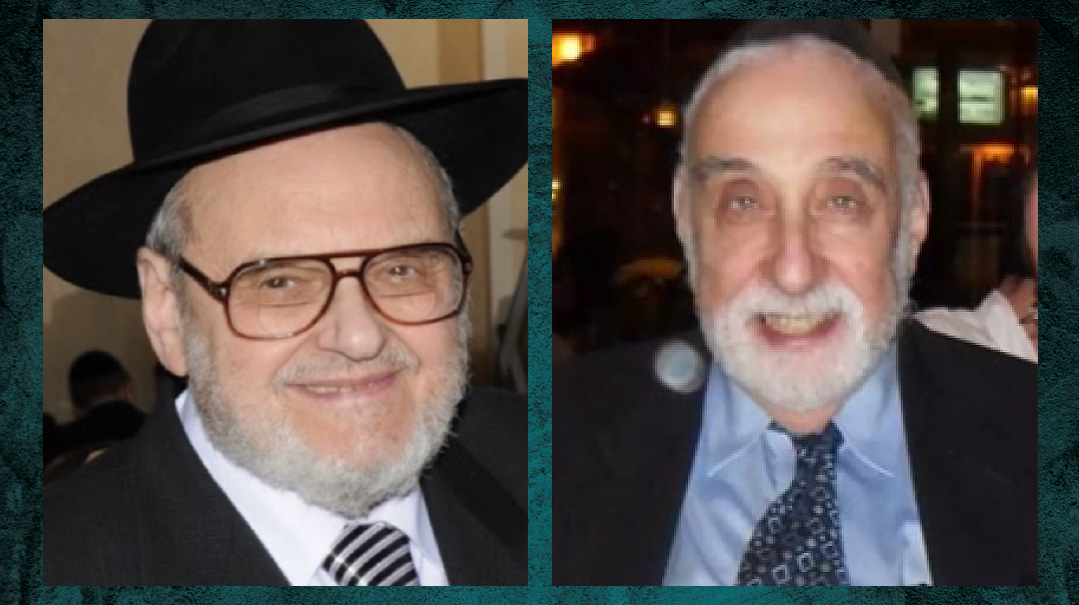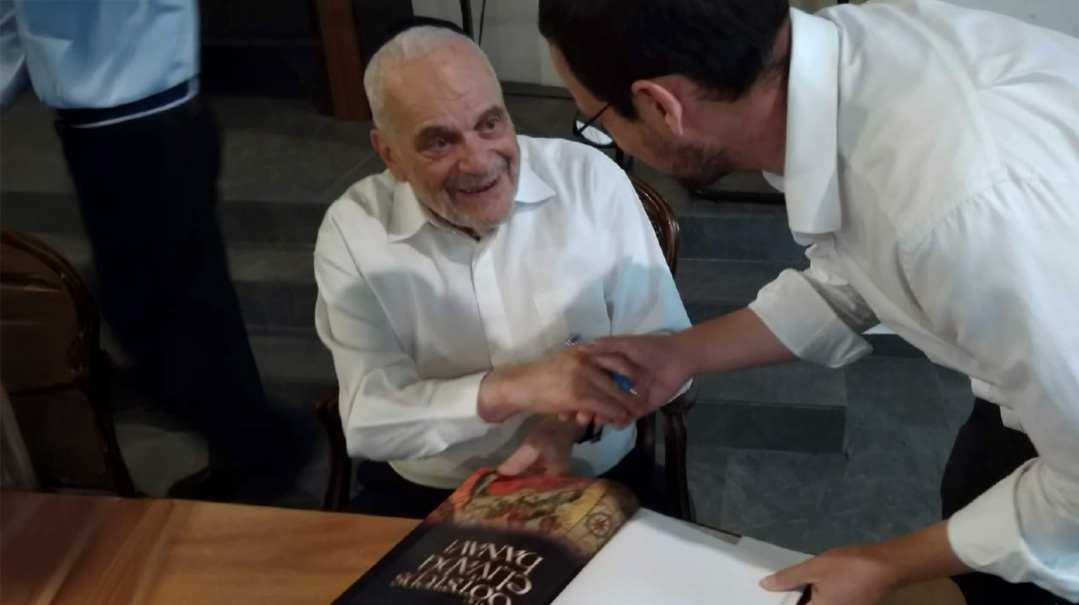A Friendship Grows in Brooklyn
| April 30, 2024A yahrtzeit tribute, three years later

F
or 53 years, the house on 56th Street held the most unlikely pair — and over those five decades, their love and friendship only deepened.
In many ways, Dr. Marvin Schick and my grandfather, Rabbi Shmuel Hoch, zichronam livrachah — could not have been more different. Dr. Schick was a fiery activist, brilliant professor, and relentless klal advocate; my grandfather was a soft-spoken talmid chacham, devoted Radziner gabbai, and ever-in-awe talmid of Rav Hutner.
Yet for half a century, they not only lived under the same roof, they developed a yedidus that continues to span families and generations.
For as long as I can remember, my second-favorite place on Earth (after home) was the spacious house with the white siding on 56th Street.
It wasn’t just because my grandparents lived on the top floor, plying us with Tofutti Cuties, Cornell lemon soda, and a ceaseless outpouring of love.
Downstairs, on the first floor, lived Marvin and Malka Schick — our third set of grandparents.
On paper, the Schicks were my grandparents’ tenants. In reality, they were — and remain — beloved family members: celebrating our joys, sharing in our nachas, and supporting us through crises in the most practical, meaningful ways.
The open inner staircase typified the families’ relationship.
“Bracha!” Malka Schick tblch”t, would call up the stairs every Friday night after candlelighting.
“We’re coming, we’re coming,” my babi, Mrs. Bracha Hoch tblch”t, would call back.
Not a Shabbos went by without us heading down the green-carpeted stairs and spending time: updating, tsheppering, and of course — debating. Lots of debating.
As a child, I sensed the Schicks were special: the passion, intelligence, and clarity of their convictions. There was a strength in their home that was palpable.
It was only when I got older that I realized what a giant I merited to know. The warm and fuzzy Zeidy Number Three whom I called “Marvin” was a towering askan — a one-man powerhouse who used every fiber of his intellect, oratory, and astounding breadth of knowledge to help his people.
When I was a teenager, the Schicks opened my eyes to a sparkling world of spirit and wit. Around their Shabbos table, there was little “narishe” talk about people or stuff — just a fast-moving, breathtakingly articulate exchange of ideas (and lots of laughs). In the Schick family, verbal sparring is an art. Newcomers to this world could only sit, open-mouthed, and squint as they concentrated, trying to keep up with the whizzing, 120-mph discussion.
But these were not the off-the-cuff opinions of ignorant men who needed a soapbox.
Marvin’s positions (and those of his children) were the product of rigorous factual analysis; for every counterargument you made, he had an instant, hard-to-refute response.
Years later, during the time I wrote regularly for weekly magazines, he would always ask me what I was working on. An askan to the core whose piercing op-eds and columns numbered in the hundreds, Marvin saw writing as a powerful conduit, and I sensed his pride in my work.
Marvin’s achievements as an askan are too many to count. Perhaps his most extraordinary feat was the single-handed revival of his alma mater, RJJ — a dying yeshivah gasping its last. After 40 years of his devoted presidency of Yeshivas Rabbeinu Yaakov Yosef, the institution today is thriving, with four schools located across New York and New Jersey.
Money and power meant little to Marvin; he was hungry for truth.
His decades-long success as an activist stemmed from an unshakable belief in every cause he undertook — and from his complete submission to his “bosses,” gedolei Torah such as Rav Aharon Kotler, with whom he shared an unusually close relationship.
Marvin’s fire was contagious, his passion unignorable. He loved HaKadosh Baruch Hu; he loved Klal Yisrael; he loved his community — and he used every waking moment of his life to further their cause.
Upstairs, a very different kind of giant resided.
My Zeidy, Rav Shmuel, was the kind of person you could set your clock by. For decades, he awoke at 5 a.m. sharp — he would daven with a minyan, drive one and a half hours to work in New Jersey, and come home with enough time to put the kids to sleep and have a two-hour seder at the dining room table.
As a bochur, Zeidy served as a role model and chavrusa for some of today’s Torah giants, including the Novominsker Rebbe ztz”l and ybdlch”t Rav Yeruchem Olshin, Rav Lipa Geldwerth, and Rav Berel Shachar. For these children of survivors, he was a novelty: an “Amerikanishe” bochur who lived and breathed Torah; a budding talmid chacham of whom Rav Avigdor Miller ztz”l said, “When Shmuel Hoch left the beis medrash, the walls cried.”
But Zeidy never really left the beis medrash. Even as he built an impressive career as a chemist — he patented numerous inventions during his four decades at Tenneco — his Torah and avodah always took front and center. Besides his regular chaburos, shiurim, and sedorim, Zeidy became a pivotal supporter of numerous mosdos — quietly giving away thousands of dollars each year.
He was singularly dedicated to his alma mater, Yeshivas Rabbeinu Chaim Berlin. In his younger years, when he had less money to give, he gave weeks of his life — calling donors, arranging parlor meetings, and coordinating appeals in shul.
His discipline was such that at age 70, after decades of moderately indulging his sweet tooth with ice cream and cakes (how he loved ice cream!), when his doctor told him he needed to lose weight to stay healthy, he stopped eating sugar, cold turkey.
Remarkably, despite his diligence and self-mastery, Zeidy epitomized sweetness and eidelkeit. In the 30-plus years I was zocheh to know him, I heard him shout once — when my little sister refused to fasten her seat belt. His oh-so-rare moments of anger stemmed never from ego, but from a deep-seated concern for our well-being.
When you sat with him, sharing the nitty-gritty details of your life (the ones only grandparents really care about), there was no sense of tension or rush; you felt he had all the time in the world. His time management was about priorities — and spending time with eineklach was a priority.
A fellow once rear-ended Zeidy’s car in the Brooklyn Battery Tunnel. He approached my grandfather, sweating and bracing for a rant. Instead, he found himself being comforted and calmed; Zeidy reassured him that it was no big deal.
In his final years, when dementia robbed him of his memory and cognition, there were a select few things that would reliably bring Zeidy to life: photos of his rebbi, Rav Hutner (“the Rosh Yeshivah!” he’d say, with a reverence that never waned); learning Chumash (even in the final throes of dementia, he glowed as he finished pesukim and teitshed them); and his favorite zemiros — the ones he’d sung every Shabbos of his life, in his deep, resonant baritone.
Nafsho keshurah b’nafsho. To me, it is no coincidence that after half a century of living together, Rabbi Shmuel Hoch and Dr. Marvin Schick took leave of This World less than 30 days apart.
Their personalities (and politics!) could not have been more different — but as the years went by, the love and respect they had for each other only grew.
Zeidy deeply admired Marvin’s complete dedication to and sweeping impact on Klal Yisrael; Marvin cherished Zeidy for his hasmadah, sweetness, and unyielding fealty to halachah.
On Friday nights at my Babi and Zeidy, we’d enjoy a seudah enveloped in peace — the table set in the exact same pattern, the predictable zemiros we loved, the steady, rhythmic shalom bayis we’d come to know well. It was comfort food for the soul.
Then, after bentshing, the Schicks would come up for dessert — and the sparks would start flying. Passion! Conviction! A battle for truth! We were now in the company of His warriors, and you could not help but feel yourself light up with purpose and mission.
For 53 years, the house on 56th Street was the consummate marriage of fire and water — a wellspring of conviction and consistency, action and erlichkeit, vitality and steadfastness.
From within its doors emerged an unstoppable force that has secured generations. Now, it stands bereft of two giants — two fiercely loyal soldiers of HaKadosh Baruch Hu who used their unique kochos hanefesh to build legacies that endure.
We — the Hoch and Schick families — are determined to carry those legacies on.
Yehi zichram baruch.
L’illui nishmasam Meir ben Dovid Yosef and Shmuel ben Nissan.
(Originally featured in Mishpacha, Issue 1009)
Oops! We could not locate your form.







